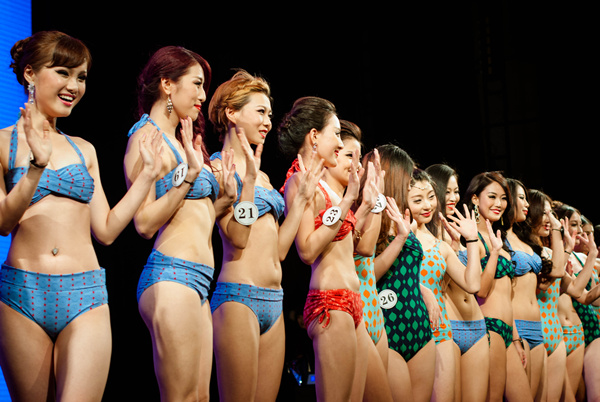Plastic to poolside for environmentally conscious fashion
 |
|
Miss Earth China 2013 candidates wear FINCH bathing suits at the pageant in Shanghai. Photo provided to China Daily |
 |
 |
Polyester, a synthetic and non-biodegradable fiber, makes up more than half of the world's fiber market. Polyester from plastic bottles is the most recycled fiber for new clothing products-it constitutes 10 percent of global polyester production-and has been around for about 25 years, says Lynda Grose, associate professor of fashion design at California College of the Arts.
Recycled polyester has been utilized in China's garment industry for at least a decade, yet Chinese brands that publicize using it are few. Among them is sportswear retailer Li Ning, whose Eco-Circle clothing line, launched in 2009, incorporates fibers made from recycled plastic bottles.
At a time when Chinese people are becoming more environmentally conscious, isn't eco-friendliness a feature that more Chinese brands would want to market?
Turns out the answer is no. "Chinese consumers believe that clothes made from virgin materials are good, while those made from recycled materials have compromised their quality," Zhao Guoliang, head of the Beijing Institute of Fashion Technology's School of Material Science and Engineering, says.
As a result, clothing brands usually don't care how their textiles are made. Their primary concern, says Zhao, is that fabric quality is up to company standards.
Transparency is an issue that FINCH itself has encountered, with both Chinese- and foreign-owned suppliers.
"What chemicals are being used to treat the fabric from the beginning to the end of the process, it's always a little bit difficult to get complete transparency into that," Kaye says in a phone call from New York, where she is promoting the brand to more retailers.
"I think that dyes are so much better than they ever have been, and we do most of our prints digitally, so there's very little water, very little heat required to set them. But there's still petrochemical dyes, so there's still an impact."
When it comes to promoting more environmentally friendly fashion, advocates are definitely getting a hand from the beauty queen Xiang. At the next Miss Earth China competition in October, she wants to give her successor not only a crown but also a bikini. You can bet that part of the bathing suit was once upon a time, a plastic bottle.
















